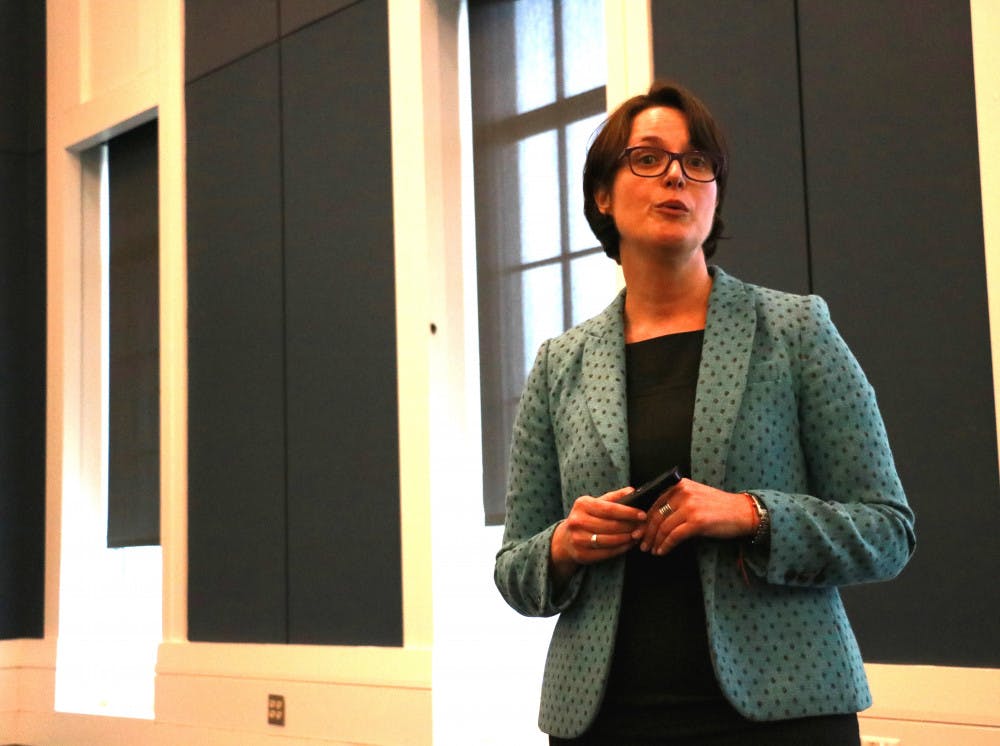By Samantha Malnick
Staff Writer
Global health care company Novo Nordisk held the last lecture of its four-part series, “Understanding Obesity: A Multidisciplinary Challenge,” on April 3 in the Education Building Room 212.
The guest speakers discussed the understanding of the personal, societal and economic impacts of obesity, as well as the steps that can contribute toward making obesity care happen.
Blandine Lacroix, a global commercial leader at Novo Nordisk, started off the lecture by outlining current statistics of obesity in the nation.
More than 95 million adults in the U.S. — more than 35 percent of American adults — are obese, and 12 million children also live with obesity, according to Lacroix.
“These (children) are living with obesity,” Lacroix said. “The weight is there, and it is already negatively affecting their health outcomes.”
Lacroix said that Novo Nordisk has sought to help diabetics for 95 years and has assisted more than 29 million people through their funding and services.
“Of those 29 million people, 80 to 90 percent of them were people struggling with weight,” she said. “The negative health outcomes of weight are the reason why most of them have Type 2 diabetes.”
Lacroix dissected the reasons why so many people struggle to control their weight.

“This is not a willpower issue,” she said. “On average, a person with obesity is going to be active in losing weight five to seven times in their life, but 95 percent of the time that weight is gained back. Losing weight is the easy part — keeping it off is where we fight nature.”
Throughout human existence, the body has adapted to be able to store fat more effectively. Lacroix believes that nothing has prepared the human species for the world that we live in today — a place filled with “toxic environments.”
One large contributor of obesity in modern society is the availability cheap, unhealthy foods in the U.S., according to Lacroix.
“For just $19.99, you can eat for two, and bring home a container of the same meal for the next day,” she said. “With all that butter, grease and carbs, how healthy of meals can you really get for just $20?”
Along with the issues of food availability comes stress, sleep deprivation, social pressures, lack of mobility and pharmaceutical drugs — all of which affect humans around the globe, Lacroix said.
Kotryna Matulyte, a senior health and exercise science major, was shocked to hear about some of the external factors that contribute to obesity.
“You don’t hear as much about the pharmaceutical side of things in my major,” Matulyte said. “Obviously it’s more of just ‘exercise,’ and that being the cure for everything.”
Novo Nordisk wants to change how the world views and treats obesity. The company believes that some of its drugs are relevant to treating obesity, but until the barrier of how patients, health care systems and employers perceive the disease is removed, it will be a challenge for Novo Nordisk to combat the social and economic issues.
Abhilasha Ramasamy, director of health economics and outcomes research for obesity at Novo Nordisk, discussed how these issues have the potential to be resolved.
Data showed that nearly 42 percent of Americans in 1965 were smokers. In 2012, the prevalence fell to 18 percent, and is expected to drop to less than 10 percent in 2024, according to Ramasamy.
“We are just scratching the surface with obesity,” Ramasamy said. “Think of obesity now as the 1965 smoking percentages. This change did not happen by a single company. For this change to happen the entire society had to come together — policy makers, payers, physicians, patients … everyone has to join hands to make this difference.”
Novo Nordisk envisions for this change to happen in the coming decades. Through research such as randomized clinical trials, personalized medicine and partnerships with stakeholders, the company hopes to educate and advocate for this societal shift in recognizing obesity as a disease.







